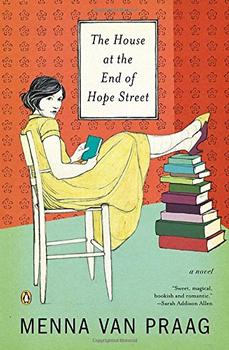Summary | Excerpt | Reading Guide | Reviews | Beyond the Book | Readalikes | Genres & Themes | Author Bio

Alba steps back to look up at the house, at its rows of dark windows, the panes of glass glinting. For a second Alba thinks she sees a face in the window above her, a flash of white and blond that disappears so the night is mirrored back at her. Alongside the window grows a plant with flowers so purple they're almost black. Its strangeness beckons Alba to come closer, rub its leaves, smell its flowers, slide her fingers into the earth . . . The charms of the house and its garden sink deeper into Alba and, without realizing what she's doing, she steps forward and rings the bell.
As Peggy Abbot scurries down the steps, pulling on her patchwork dressing gown, a picture of Alba starts to take shape in her mind: tiny and built like a boy, spiky black hair, intense blue eyes, a mouth that rarely smiles, a weight of sadness and self-doubt heavier than Peggy has ever felt before, but a sense of sight stronger even than her own. Suddenly she knows that this might be a dangerous thing indeed. The midnight glory is in bloom tonight. If Alba looks for too long she might see what makes its petals glow and, worst of all, sense what's buried beneath it.
Wishing she were forty years younger, Peggy hurries along the hallway, slipping on the wood in her woolen socks. But she doesn't have to worry. In her current mental state, Alba's sense of sight is significantly dimmed so the secret is safe for now. When the door swings open, Alba steps back in shock, staring into the face of the oldest and most beautiful woman she's ever seen.
The moment Alba steps into the house, she knows it's different from any home she's ever known. It is, quite clearly, alive. The walls breathe, gently rising and falling beside Alba as she follows the old woman down the hall. The stripped oak floorboards soften under her feet in welcome, the lightbulbs and lampshades pull at the ceiling to get a closer look at her.
As she walks Alba gazes at the walls, weighted down by hundreds of framed photographs: black-and-white pictures of different women, in group shots and singles, wearing trouser suits and top hats, flapper dresses and flat caps, ribbons and pearls. Among the photographs are pictures, pencil drawings and silhouettes, and a few miniature oil paintings of powder-puffed female faces with curls piled high on their heads.
"Wait." Alba almost stumbles into the wall. "That's Florence Nightingale." "Oh yes," Peggy says. "She stayed with us for a spell before she went off to the Crimea. When my great-, great-, great-aunt Grace Abbot ran the house. A lovely girl by all accounts, Flo, though rather strong willed and a little too fond of sailors . . ." Peggy smiles. "Gosh, really?" Alba whispers. "That's . . . gosh."
As Peggy ushers her into the kitchen Alba feels a flash of fear. She ought to think twice before entering the homes of complete strangers. Hidden behind Peggy's bright eyes might be the mind of a murderess; under the folds of her patchwork dressing gown could beat the heart of an evil witch who sees Alba as a modern-day Gretel. But when Alba enters the kitchen she's enveloped in the scent of something magical: cinnamon, ginger, lavender and several spices she can't possibly name, and her fears evaporate. She feels three years old again, transported to a wished-for childhood of baking biscuits with her mother on Sunday afternoons. If Peggy is bewitching her, then the spell is complete.
A few minutes later Alba sits at one end of a long oak table, watching Peggy search for a saucepan. The old woman is bent over, clattering around in the wooden cupboards, muttering swear words as she flings unwanted pans aside. Alba begins to wonder just how old Peggy is. With her white hair and papery skin, slight stoop and frail limbs, she might be anything from seventy to a hundred and seven. But her movements are quick and light and her voice doesn't carry any quiver or depth from age.
Peggy stands, brandishing a saucepan. "I hope you like hot chocolate, dear," she says. "I don't think tea will quite do, we need something a little more fortifying on such an auspicious occasion. Hot chocolate with fresh cream, that's the thing."
Excerpted from The House at the End of Hope Street by Menna van Praag. Copyright © 2013 by Menna van Praag. Excerpted by permission of Pamela Dorman Books. All rights reserved. No part of this excerpt may be reproduced or reprinted without permission in writing from the publisher.




Finishing second in the Olympics gets you silver. Finishing second in politics gets you oblivion.
Click Here to find out who said this, as well as discovering other famous literary quotes!
Your guide toexceptional books
BookBrowse seeks out and recommends the best in contemporary fiction and nonfiction—books that not only engage and entertain but also deepen our understanding of ourselves and the world around us.